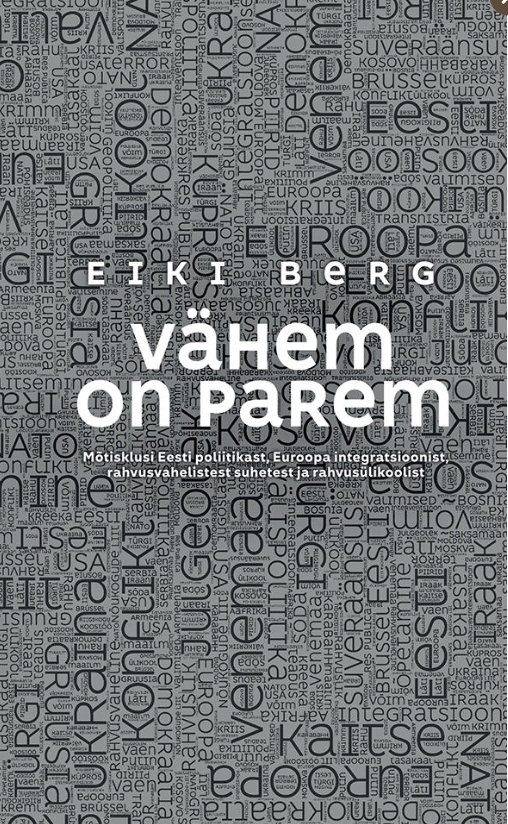Long summers in the countryside, nighties sewn by my mother, the ground floor of the Tallinn department store at Christmas and the bookshop on Pärnu maantee where one could inspect a volume only if one asked the shopkeeper for it from the shelf.
Memories of the 2000s are more detailed and colourful. I was in primary school. Mobile phones began to spread and everyone could order a ringtone to match their favourite song from the back of a magazine. The first computers appeared in homes and after school we went to visit classmates whose parents had bought one and allowed us to use it. The events of 9/11 entered my mind through a youth programme on TV that started just as I came home from school and heated something to eat on the stove.
The first memory that comes to mind of the 2007 Bronze Soldier unrest is of a helicopter buzzing in the sky all night long. I was home alone and tried to calm my mother over the phone, as she had gone on a work trip for two days, explaining that everything was calm in Kadriorg and I would go to school the next day, if it was open.

I’m recollecting these memories to underline the thought that my generation was not politically active during the 1990s and 2000s. Our political awakening occurred sometime in the early 2010s.
For me, NATO and the European Union weren’t choices for which to strive or to oppose. For me, Estonian membership in these organisations has been a fact. Thus, I can sympathise with those who endeavoured to make Estonia’s accession happen but I don’t share their knowledge of what it means to be outside these organisations.
Eiki Berg’s collection of articles, Vähem on parem (Less is More), provides an insight into these events and the last 30 years of Estonian politics. I’m part of the first generation who has to learn about the events that happened in the 1990s and 2000s and can’t discuss matters that have now become the norm based on their personal experiences. That is why this collection is relevant—it explores the dilemmas and choices Estonia faced in those years.
To seasoned observers, Eiki Berg’s book must be a nostalgic trip down memory lane and a reminder of their journey. Sometimes it doesn’t hurt to look back and recall the choices and dilemmas with which we have been confronted. After all, the decisions taken don’t erase the opposing party or their viewpoints. Sometimes looking back helps us to understand better the present day and consider our next steps.
I’d also like to touch upon a subject Eiki Berg mentions in several articles—the multi-speed EU. The idea is as follows: member states that wish to cooperate in a certain field can do so and move forward with the integration process, while countries that don’t want to cooperate on that matter can stand aside but won’t hinder the activities of members who are open to collaboration. This methodology gave rise, for example, to the Schengen area, the eurozone and Permanent Structured Cooperation (PESCO), part of the EU’s security and defence policy.
The multi-speed integration of Europe is a hot topic in Brussels and the capitals of member states. It doesn’t exactly reach the front pages of newspapers but it is still actively discussed by researchers and practitioners. I’d like to point out one aspect Berg doesn’t mention in his articles: a multi-speed Europe is a technical solution to political problems. Member states don’t cooperate because they aren’t able to agree on a golden mean, since their wishes and restrictions differ. Take, for example, fighting climate change. Let’s say that Germany, Croatia, Portugal and Finland want to cooperate more closely in resolving climate issues than the 28 member states together. If these four countries start to collaborate, does that solve the climate change-related challenge Europe must face? No, because while the aforementioned quartet diligently follow their climate policies, the other 24 member states continue with their old ways.
Fighting climate change is a collective undertaking, just like several other challenges Europe must tackle, where size matters and borders don’t. If the EU wants to be at the forefront of combating the climate crisis, it is only possible if all member states are able to reduce the volume of European emissions as a result of changing their collective behaviour. The activities of my make-believe quartet are good and commendable, but don’t solve the problem as such. Thus, a multi-speed Europe is the appropriate choice if the purpose is to demonstrate a European cooperation of sorts, but it doesn’t offer solutions to issues and, rather than increasing efficiency, it may lead to a “diffused union”, in Erki Berg’s apt wording. This means that everyone would carry on with their business independently without a strong centre.
One must therefore inevitably ask: what is the purpose of the EU and European integration? Is it to carry out superficial cooperation or to be a competitive and relevant organisation?





























